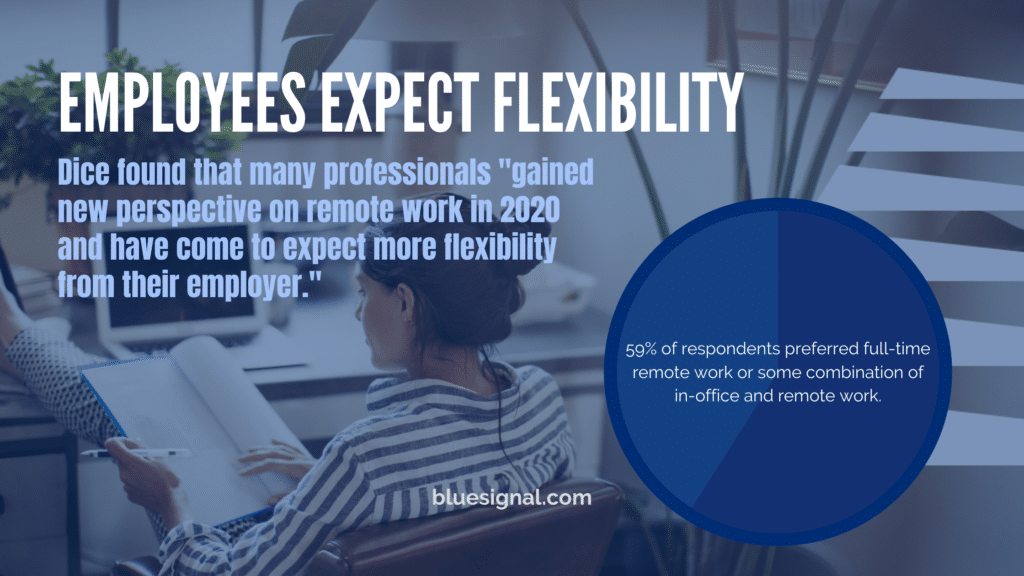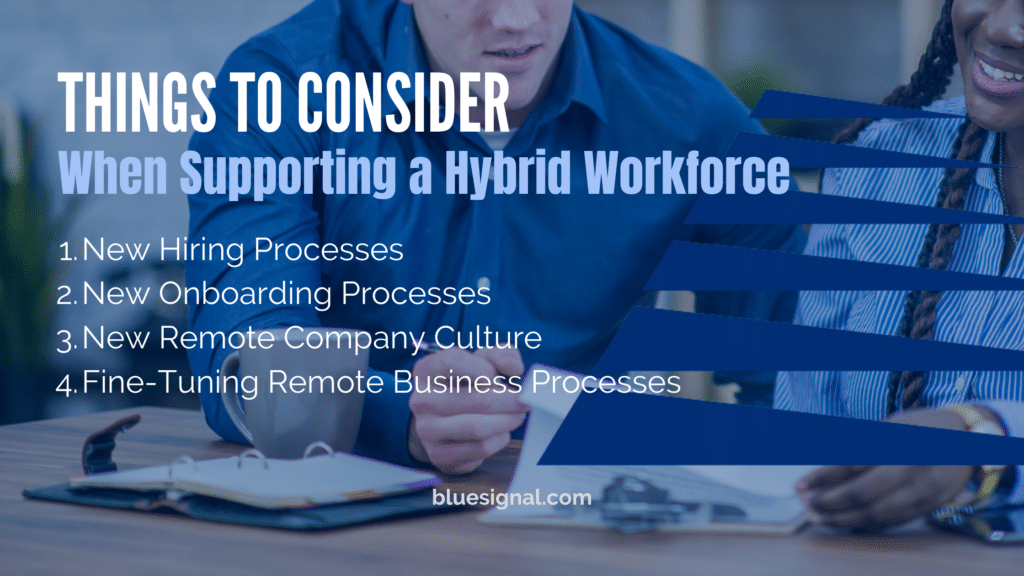In this digital age, many companies are turning to virtual recruiting to help supplement an increasingly remote and hybrid workforce. Several top companies have started the switch, recognizably Ford, Citigroup, Microsoft, and Spotify. With the pandemic driving an immediate need, we’ve accelerated global digitization on a large scale. However, it’s leading many in management to question how going remote will affect productivity, profitability, and their workforce.
When it comes to employees’ wants, the message is clear. According to Dice’s 2021 Technologist Sentiment Survey, 59% of respondents preferred full-time remote work or some combination of in-office and remote work. Dice theorizes that the events of 2020 have given several professionals a new outlook on remote work, and in turn they have come to expect more flexibility from employers. Furthermore, Dice estimates that 149M new technology jobs will join the market by 2025 to support this digital shift. So how can companies make the switch to a hybrid workforce - especially among a market with such exponential growing need? That’s where virtual recruiting can help.

Choosing a Hybrid or Remote Workforce - What Recruiters Can Tell You
As a Hiring Authority
Several studies have proven that employing a hybrid workforce has had a positive impact on productivity, as well as significant money savings. From a hiring perspective, the greatest benefit of all comes from hybrid workforce models opening up the candidate pool to independent talent. By widening your search parameters and allowing people to telecommute, you can tap into a candidate pool that would have been inaccessible otherwise - whether that’s due to geography or time commitment constraints.
We know what you’re thinking - managing a remote workforce during 2020 was nothing short of an immense challenge - why would we go back to that? Contrary to popular belief, most of the struggles workers experienced during pandemic-era remote work aren’t a hindrance to actual remote work. For instance, with children going back to in-person learning settings, professionals no longer need to balance work with childcare during their normal 9 to 5. Not to mention, in this increasingly competitive marketplace, allowing hybrid work could be the key to better retention. In the talent acquisition industry we know that it’s not the setting that makes or breaks a good employee - it’s the employee themselves, and their drive to succeed. Those who do remote work right can do it well.
As an Employee
Hybrid work models offer a plethora of benefits for workers, when the job permits. Several noteworthy pros include and better work/life balance. But if you were to ask a recruiter, they’d tell you that the most important benefit remote work gives you is location independence. Where would you live if you could take your work with you? The possibilities are only limited by the reach of your Wi-Fi! Simply put, negotiating hybrid or remote work options into your employment contract can give you more freedom in how and where you spend your time, and a recruiter can help support you on that journey.
Building Your New Talent Brand as a Hybrid Employer
Once you’ve decided to take the plunge and allow hybrid work, your next step should be toward solidifying your employer brand as a hybrid workforce. In order to attract the digitally savvy candidates you are looking for, you’ll have to meet them where they’re at. Focus your online presence on attracting candidates, especially those Gen Y (Millennials) and Gen Z professionals. Hybrid work models appeal greatly to the next economy-leading generations, which works out well considering they are the ones who were raised in the digital age. Leverage your recruiters to help you navigate this market. As talent specialists, we have the insider knowledge needed to hack into that hybrid-seeking candidate pool.

Things to Consider When Supporting a Hybrid Workforce
New Hiring Processes
Just as with many areas of work changing to accommodate this digital shift, hiring is following suit. Make sure you are prepared to tackle this new process before beginning your talent searches. Do you have the right tools to recruit remotely? What are your new interview timeframes, when you counter in a mix of in-person and virtual interviews? Are you prepared to negotiate remote work structures when you make an employment offer?
Candidates are ready to ask for what they want when it comes to hybrid working. Your business needs to have offer letter structures in place that reflect what you need from which roles when it comes to hybrid work, such as: how often someone is required to be in office, what their working hours should be when working from home, and what the expectation is when it comes to completing various projects associated with the role. Your needs can vary in flexibility given the scope of the role you hire. Leverage your recruiter to ensure none of these details slip through the cracks, and make expectations clear from the onset.
New Onboarding Processes
Establish what your onboarding process will look like for new hybrid hires. Will initial training be in person? What will you provide for their remote office workspace, and what will they need to provide on their own? What kind of support can you give employees when they’re working remotely, such as IT, mentorship, HR contacts, etc.? It may be hard to visualize what you need ahead of time, but ask your recruiter for what practices would best fit your work model.
New Remote Company Culture
When allowing employees to work from home, it’s easy to forget that you are quite literally entering a new part of their lives. Even with virtual backgrounds and pre-scheduled meetings, you’ll be immersed in their home lives by “meeting” them in their own living rooms. This doesn’t need to change the professional dynamic of your reporting relationship, but it’s important to remember when building out this new remote company culture.
Even when working in-person, it’s a simple fact that most full-time professionals may be spending more time with their coworkers than they do with their own spouses and kids. Now, that same time is spent virtually! Therefore, it’s important to be real with your workforce in this setting and maintain that same bond that you would in person, over the computer or phone. Create an atmosphere of mutual respect that acknowledges the reality of working from home, and trust that they’re on task even when you can’t knock on their office door to check in. For more best practices on keeping a remote workforce actively engaged, ask your recruiter.
Fine-Tuning Remote Business Processes
Make sure to leverage opportunity when it’s presented to you. For instance, your newly hybrid workforce may be available to customers in different time zones, expanding the hours in which you’re accessible. Processes that were once manual may be able to be digitized, like submitting reports or internal communications.
Your recruiter can confirm, a hybrid workforce can come with some unforeseen advantages. However, knowing ahead of time what can and cannot be digitized will help you determine how often you need your employees in the office or remote. According to the Dice 2021 Technologist Sentiment Report, more than half of respondents indicated a preference for full-time remote work or a combination of in-office/remote work, while just 17% indicated they would prefer to work in an office 100% of the time. In Dice’s Q4 2020 Salary Survey, participants said they desired 2-3 days in-office per week - thus confirming that there is no one-size-fits-all approach to creating remote workforce plans. Consult with your recruiter on what best aligns the market’s wants with what you’re willing to offer potential employees.
How a Recruiter Can Help Build Your Hybrid Workforce
In the age of digital recruiting, there are several recruiters out there who specialize in procuring and supporting remote workers. Do your research and pick a hybrid workforce recruiter that you can partner with on your quest to dominate your new working model. A good recruiter will be able to coach you through the virtual hiring and onboarding process, a great recruiter will be able to take the hybrid interviewing off your hands. They will know how to best access the hybrid talent pool, and will provide search services catered to your unique search. Once you’ve found who you want to hire, your recruiter can impart best practices for an awesome, flexible office culture.
The world of employment is changing, and employers will need to adapt to remain competitive. Make sure to choose a plan that’s best for you by hiring a hybrid workforce recruiter that can deliver your hiring goals. As specialists in this space, Blue Signal can give you this and more on your way to becoming a dominant hybrid workforce.
